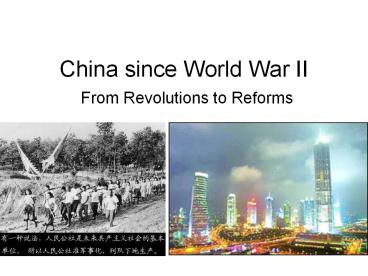China since World War II From Revolutions to Reforms - PowerPoint PPT Presentation
Title:
China since World War II From Revolutions to Reforms
Description:
China since World War II. From Revolutions to Reforms. Outline. GMD-CCP Civil War (1946-1949) Recovery and Socialism (1949-1956) ... – PowerPoint PPT presentation
Number of Views:138
Avg rating:3.0/5.0
Title: China since World War II From Revolutions to Reforms
1
China since World War II From Revolutions to
Reforms
2
Outline
- GMD-CCP Civil War (1946-1949)
- Recovery and Socialism (1949-1956)
- Rethinking the Soviet model (1956-1957)
- Great Leap Forward (1958-1961)
- Recovery growing elite division (1962-5)
- Great Cultural Revolution (1966-1976)
- Reforms and opening up (1978- )
3
Legacies of imperial China
- political philosophy of Confucius (551-479 B.C.)
- ordered hierarchy of harmonious relationships
- bureaucracy of scholar-officials
- political system of centralized imperial rule
- endured from 221 B.C. to 1911 A.D.
- The last dynasty Qing (1644-1911)
- domestic rebellion and foreign encroachment
- replaced by the Republic of China in 1912
4
War of Resistance Against Japan (1937-1945)
5
GMD-CCP Civil War 1946-1949
- GMD Guomindang (Nationalist Party)
- Chiang Kai-shek (President)
- CCP Chinese Communist Party
- Mao Zedong
6
Peoples Republic of China
- 1949-10-01, PRC, Beijing
- Chairman Mao Zedong
- 5-Star Red Flag
- Republic of China government retreated to Taiwan
7
Economic Reconstruction 1950s
- Soviet Union model and assistance
- land reform (eliminate landlord class)
- heavy industry (state-owned enterprises)
- First National Peoples Congress (1954)
- PRC Constitution
- Zhou Enlai
- Premier
- Foreign Minister
8
Great Leap Forward (1958-1960)
- abandon the Soviet model of economic development
- Soviet scientific planning
- mass mobilization
- peoples communes
9
Great Leap Forward (1958-1960)
- unrealistic output targets
- industry
- agricultural and human disaster
10
Growing Division (1962-1965)
- Mao Zedong vs. Liu Shaoqi and Deng Xiaoping
- charismatic leadership vs. bureaucracy
11
Cultural Revolution (1966-76)
- Great Proletarian Cultural Revolution
12
Cultural Revolution (1966-1976)
- Purge of party cadres
- Purge of intellectuals
13
Cultural Revolution (1966-1976)
- Purge of Liu Shaoqi Deng Xiaoping
- 1966 - 1971 Lin Biao
- 1972 - 1976 Gang of Four
14
Diplomatic Achievements
- 1971, PRC became the representative of China in
UN (replaced ROC) - 1972, President Nixon visited Beijing
15
Mao and Zhou Died in 1976
- Turning point in Chinas postwar era
- Gang of Four were arrested
- End of the Cultural Revolution
16
Reforms and Opening up
- The 3rd Plenum of the 11th CCP Central Committee
in 1978 - Deng Xiaopings ascendancy
- economic modernization became focus
- US-PRC established diplomatic relationship in 1979
17
Deng Xiaoping
- Deng Xiaoping as the general architect of
reforms and opening up (1978-1997) - Deng handpicked 3 successive CCP General
Secretaries - Zhao Ziyang (1987-1989)
- Jiang Zemin (1989-2002)
- Hu Jintao (2002- )
- economy growing out of the plan
18
(No Transcript)
19
Tiananmen 1989
- CCP General Secretary Zhao Ziyang (elite
reformist) was removed from all positions - Deng Xiaoping retired from day-to-day policy
making
20
socialist market economy
- break the monopoly of state ownership
- 11 million private enterprises employ 113 million
people at the end of 2012 - 41 million household enterprises employ 86
million people at the end of 2012 - foreign-invested enterprises employ 12 million
- reforms of the state-owned enterprises
- transformation into joint-stock companies
21
(No Transcript)
22
(No Transcript)
23
(No Transcript)
24
Hong Kong
- On July 1, 1997, Britain returned Hong Kong to
China - Hong Kong Special Administrative Region
25
China joined WTO in 2001
- Expansion of trade and investment
- weed out inefficient state-owned enterprises
- further retreat of state from economy
- further divide
- urban-rural
- coastal-inland
- unemployment
26
Recent political changes
- Then CCP General Secretary Jiang Zemin announced
in 2001 that the Party would recruit private
entrepreneurs - in the 18th CCP National Congress in November
2012, Xi Jinping replaced Hu Jintao as the
General Secretary of CCP - in the 12th National Peoples Congress in March
2013, Xi Jinping replaced Hu Jintao as the
President of PRC































